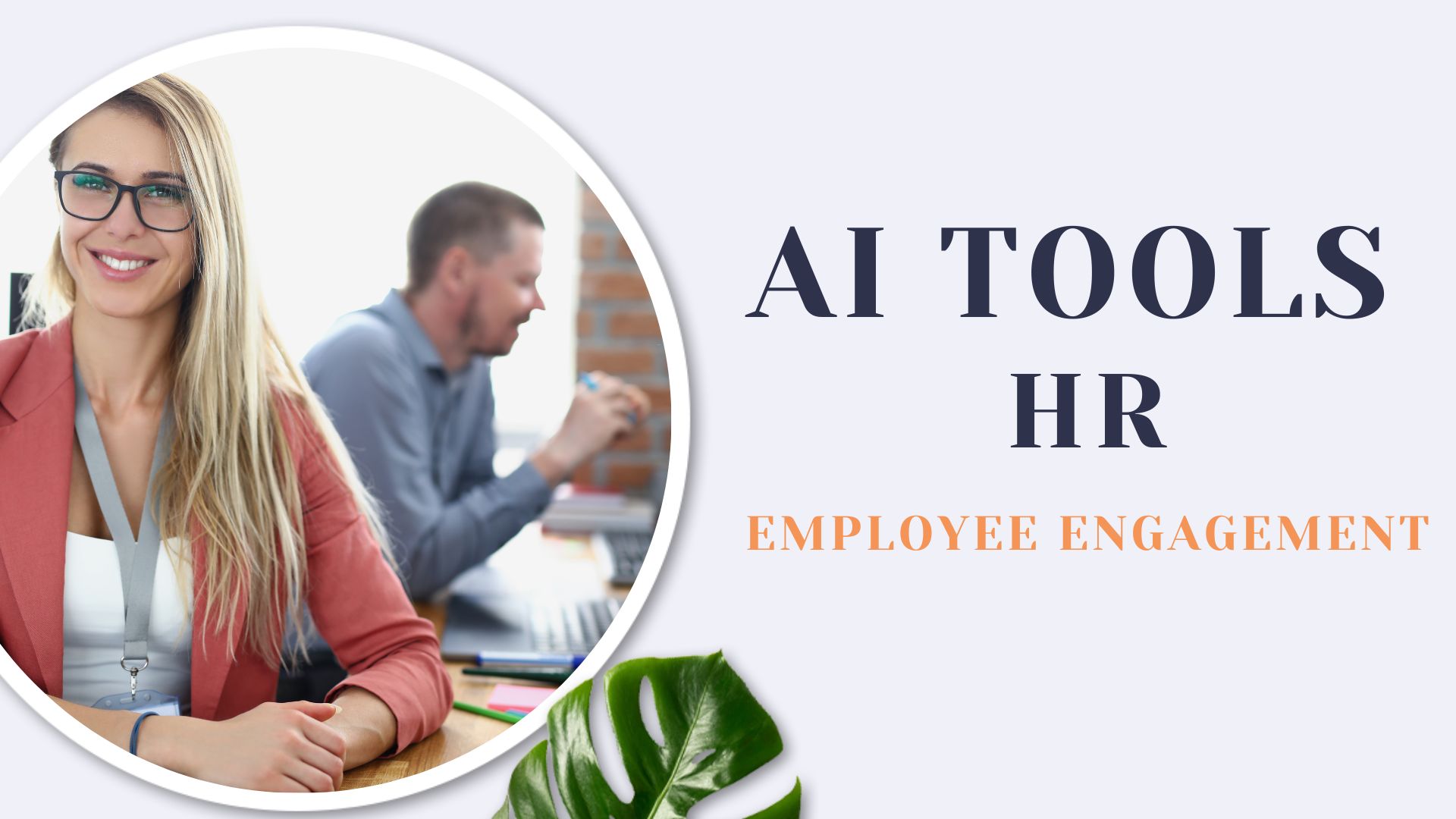AI tools for HR professionals are cutting-edge algorithms that help streamline various HR tasks such as recruitment, onboarding, and employee management. These tools, like pandoIQ, Beamery, and Seekout, leverage AI to automate processes, identify top candidates, and optimize budget allocation.
They also enable HR departments to generate personalized messages and announcements, offer real-time support through chatbots, and anticipate outcomes using predictive analytics. With the implementation of AI in HR, professionals can save time and resources while improving efficiency and engagement within their organizations.
Furthermore, generative AI can enhance employee engagement by providing personalized content and automating frequently asked questions. AI tools have revolutionized HR management, making them essential for every HR professional.
The Role Of Ai Tools For Hr Professionals
AI Tools for HR professionals revolutionize the field by tackling various tasks such as budget optimization, job candidate identification, and automating recruiting processes. These cutting-edge tools like pandoIQ, Beamery, and Paradox AI streamline HR management and enhance efficiency. With AI being used for payroll automation, policy creation, and predictive analytics, HR professionals can anticipate and plan for future outcomes.
Additionally, generative AI can improve employee engagement through personalized messages and AI-powered chatbots for real-time assistance.
How Ai Tools Are Transforming Hr Processes
The rapid advancement of artificial intelligence (AI) has revolutionized various industries, and human resources (HR) is no exception. AI tools are transforming HR processes, bringing unprecedented efficiency and effectiveness to the table.Benefits Of Using Ai Tools In Hr
Implementing AI tools in HR can bring a wide range of benefits to professionals in the field. Here are some advantages of incorporating AI into HR processes:- Enhanced Recruitment: AI tools can automate candidate sourcing and screening, making the recruitment process more efficient. These tools can analyze resumes, assess candidate skills, and even perform automated interviews.
- Improved Employee Engagement: AI-powered chatbots can provide employees with real-time assistance and information. These chatbots can answer frequently asked questions, provide personalized messages, and even generate newsletters or announcements.
- Streamlined Onboarding: AI tools can help overcome onboarding challenges by providing automated support to new hires. They can guide employees through the onboarding process, ensuring a smooth transition into the company.
- Efficient Performance Management: AI tools can analyze employee performance data and provide valuable insights. They can identify patterns, trends, and areas for improvement, enabling HR professionals to make data-driven decisions when it comes to performance management.
- Effective Training and Development: AI tools can personalize training programs based on individual employee needs and preferences. They can create customized learning paths, recommend relevant courses, and track progress, ensuring optimal skill development.
Streamlining Recruitment With Ai Tools
Streamlining the recruitment process is a top priority for HR professionals, and with the advent of AI tools, this task has become easier and more efficient than ever before. AI algorithms are revolutionizing candidate sourcing and screening, as well as automating job postings and applicant tracking.
Using Ai Algorithms For Candidate Sourcing And Screening
AI algorithms enable HR professionals to quickly and accurately identify top job candidates from a large pool of applicants. These algorithms use machine learning techniques to analyze resumes, cover letters, and other application materials, allowing recruiters to focus their attention on the most qualified candidates.
By leveraging AI algorithms for candidate screening, HR professionals can save valuable time and resources that would otherwise be spent manually reviewing applications. This not only speeds up the recruitment process but also ensures that only the most suitable candidates are considered for further evaluation.
Automating Job Postings And Applicant Tracking
AI tools also offer the ability to automate job postings and applicant tracking, simplifying the administrative tasks associated with recruitment. With AI-powered software, HR professionals can create and distribute job listings across various platforms with just a few clicks.
Additionally, these tools enable automated applicant tracking, allowing HR professionals to efficiently manage and organize candidate information. This includes maintaining a database of applicant profiles, tracking their progress through the recruitment process, and even sending automated updates and notifications.
By automating job postings and applicant tracking, AI tools enhance the speed and accuracy of the recruitment process. HR professionals can focus their energy on other crucial activities, such as conducting interviews and evaluating candidates, instead of getting bogged down by administrative tasks.
In conclusion, AI tools have revolutionized the way HR professionals streamline recruitment processes. By utilizing AI algorithms for candidate sourcing and screening, as well as automating job postings and applicant tracking, HR professionals can save time and resources while ensuring the selection of the most suitable candidates. These tools enable a more efficient and effective recruitment process, ultimately benefiting both HR professionals and job seekers alike.
Enhancing Employee Engagement With Ai Tools
Enhancing employee engagement is made easier with AI tools for HR professionals. These cutting-edge algorithms tackle daily tasks such as budget optimization and job candidate identification, revolutionizing HR management. From streamlining recruitment processes to providing automated HR support, AI tools are transforming the way HR departments operate.
Leveraging Ai For Personalized Employee Communications
Generative AI can greatly enhance employee engagement by providing personalized and targeted communications. With the power of AI algorithms, HR professionals can generate customized messages, newsletters, or announcements for each employee, increasing their sense of belonging and connection to the company.
These personalized communications can be created based on an employee’s interests, preferences, and past behavior, creating a more meaningful and engaging experience. AI-powered tools can analyze large amounts of data, including employee feedback, performance metrics, and social media activity, to generate tailored content that resonates with each individual.
Utilizing Chatbots For Real-time Hr Support
Chatbots are revolutionizing HR support by providing real-time assistance to employees. These AI-powered virtual assistants can answer frequently asked questions, provide HR-related information, and guide employees through various processes, such as benefits enrollment, time-off requests, and performance evaluations.
By leveraging chatbots, HR departments can ensure that their employees have access to instant support, regardless of time or location. Chatbots can provide 24/7 assistance, freeing up HR professionals to focus on more strategic tasks while improving employee satisfaction and engagement.
Optimizing Hr Management With Ai Tools
Optimize HR management with AI tools that revolutionize processes and improve efficiency. From automating recruiting and talent search to streamlining onboarding and employee engagement, these cutting-edge solutions help HR professionals tackle daily tasks with ease.
Automating Payroll And Benefits Administration
One of the key benefits of incorporating AI tools into HR management is the ability to automate payroll and benefits administration. By leveraging AI algorithms, HR professionals can streamline and optimize the entire process, saving significant time and resources. Manual tasks, such as data entry, calculating payroll, and managing benefits, can now be seamlessly handled by AI-powered software and machine learning models.
Predictive Analytics For Workforce Planning
In today’s competitive business landscape, workforce planning is crucial for organizations to stay ahead. AI tools equipped with predictive analytics capabilities can help HR professionals analyze historical data, identify trends, and make accurate forecasts for future hiring needs. By leveraging AI’s ability to analyze vast amounts of data quickly, HR professionals can optimize their workforce planning strategies, ensuring they have the right talent in the right positions at the right time.
Implementing Ai In Hr: Best Practices
Implementing AI in HR: Best Practices Discover the top AI tools for HR professionals that revolutionize HR management. From automating the recruitment process to streamlining people processes and employee management, these tools offer cutting-edge solutions to optimize HR tasks. With AI algorithms, HR departments can now effectively tackle budget optimization, job candidate identification, onboarding challenges, and more.
Stay ahead in HR with the power of AI.
Steps To Successfully Integrate Ai Tools In Hr Processes
A successful integration of AI tools in HR processes requires careful planning and execution. Follow these steps to ensure a smooth implementation:
- Evaluate your HR needs: Start by identifying the specific areas in your HR processes that can benefit from AI tools. Whether it’s recruitment, payroll management, or employee engagement, pinpointing the areas that can be optimized with AI will help you choose the right tools for the job.
- Research AI solutions: Once you have identified your HR needs, research the market for AI tools that align with those needs. Look for tools that have a proven track record, positive reviews, and a user-friendly interface.
- Pilot testing: Before implementing an AI tool across your entire HR department, consider conducting a pilot test. This will allow you to assess its effectiveness, gather feedback from users, and make any necessary adjustments before rolling it out company-wide.
- Training and support: Ensure that your HR professionals receive proper training on how to use the AI tools effectively. Additionally, provide ongoing support to address any questions or issues that may arise during the implementation process.
- Monitor and evaluate: Continuously monitor the performance of the AI tools and gather feedback from HR professionals. Regularly evaluate their impact on HR processes and make adjustments as needed to maximize efficiency and effectiveness.
Key Considerations For Data Privacy And Ethics
When implementing AI tools in HR, it is essential to prioritize data privacy and ethics. Consider the following:
- Data security: Ensure that the AI tools you choose have robust data security measures in place. This includes data encryption, secure storage, and compliance with applicable data protection regulations.
- Transparency: Choose AI tools that provide transparent explanations of how they make decisions and use data. Transparency builds trust among employees and mitigates potential ethical concerns.
- Consent and anonymity: Obtain informed consent from employees regarding the collection and use of their data. Additionally, respect their right to remain anonymous if they choose to do so, when feasible.
- Regular audits: Conduct regular audits to ensure that the AI tools are used in a manner that is ethical and compliant with company policies and legal requirements.
Frequently Asked Questions On Ai Tools For Hr Professionals
What Ai Tools Are Used In Hr?
AI tools used in HR include pandoIQ for budget optimization and job matching, Beamery for automating recruitment processes, Totara for training and development, Talkpush for candidate screening, Olivia for streamlining people processes, iMocha for skills testing, Talmundo for onboarding, and Leena AI for automated HR support and employee engagement.
AI is also used in automating tasks like payroll and benefits administration, creating new policies and contracts, and using predictive analytics for planning. Generative AI can improve employee engagement by generating personalized messages and deploying chatbots for HR-related information.
How Is Ai Being Used In Hr?
AI is used in HR to automate tasks like payroll and benefits administration. It is also used for creating new policies, contracts, job descriptions, and interview questions. Predictive analytics and machine learning help in anticipating and planning outcomes. Generative AI improves employee engagement by generating personalized messages and chatbots answer frequently asked questions in real-time.
HR professionals can use AI tools like Juicebox AI, Effy AI, and AI job search and interview tools.
How To Implement Ai In Hr?
To implement AI in HR, start by identifying specific tasks and processes that can be automated. Look for AI tools, such as conversational AI assistants, recruitment and skills testing platforms, and automated HR support systems. Integrate these tools into your existing HR systems and processes to streamline activities like payroll, benefits administration, onboarding, and employee engagement.
Generative AI can also be used to personalize communication and provide real-time assistance through chatbots. Stay updated on the latest AI tools and trends in HR to optimize your HR management.
What Is Generative Ai In Hr?
Generative AI in HR refers to the use of artificial intelligence to generate personalized messages, newsletters, and announcements to improve employee engagement. It also involves deploying AI-powered chatbots to answer FAQs, provide HR-related information, and assist employees in real-time. HR leaders can leverage generative AI to enhance communication and streamline HR processes.
Conclusion
Incorporating AI tools into HR departments has revolutionized the way professionals handle their daily tasks. With cutting-edge algorithms, these tools, such as pandoIQ, Beamery, Anodot, Totara, and Talkpush, provide innovative solutions for budget optimization, candidate selection, and streamlining recruitment processes.
Implementing AI in HR can automate administrative tasks like payroll and benefits administration while also generating personalized messages to improve employee engagement. By utilizing AI tools, HR professionals can enhance productivity, efficiency, and overall success within their organizations.

Alex Santcez is a seasoned financial blog writer known for his insightful analysis and expert commentary on a wide range of financial topics. With a background in finance and a keen understanding of market trends, Alex has established himself as a trusted voice in the financial blogging community. His well-researched and thought-provoking articles provide readers with valuable insights into investment strategies, economic developments, and personal finance management. Alex’s ability to break down complex financial concepts into digestible and accessible content has garnered him a dedicated following. Whether exploring the nuances of stock market fluctuations, offering tips on wealth management, or delving into the latest economic indicators, Alex Santcez’s contributions to the financial blogosphere consistently demonstrate a commitment to empowering readers with the knowledge needed to make informed financial decisions.


